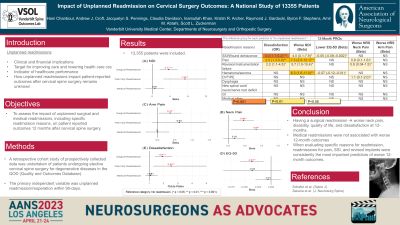Impact of Unplanned Readmission on Cervical Surgery Outcomes: A National Study of 13355 Patients
Friday, April 21, 2023


Scott L. Zuckerman, MD, MPH
Assistant Professor of Neurosurgery and Orthopaedics
Vanderbilt University Medical Center
Nashville, Tennessee, United States
ePoster Presenter(s)
Introduction: Using the Quality Outcomes Database (QOD) registry of patients undergoing cervical spine fusion surgery, we sought to: 1) determine the impact of unplanned readmission on patient-reported outcomes (PROs), and 2) compare the effect of different readmission reasons on PROs.
Methods: A multi-institution, multi-surgeon, retrospective cohort study was queried for patients undergoing cervical spine fusion surgery included in the QOD. The primary exposure was the occurrence of a 90-day unplanned readmission, which was classified into the following subcategories: medical, surgical, and pain readmissions. Other exposure variables were preoperative and perioperative data. Outcome variables consisted of the 3-12- month PROs, and included: Numeric Rating Scale (NRS)-Neck/Arm pain, Neck Disability Index (NDI), EQ-5D, and patient dissatisfaction. Multivariate logistic and linear regressions were performed.
Results: Of 13,355 patients undergoing cervical spine fusion surgery, 10,897 (81.6%) underwent anterior fusion and 2458 (18.4%) underwent posterior fusion. Mean age was 56.7±11.5 and 6,594 (49.4%) were females. Unplanned readmission within 90-days of surgery was seen in 503 (3.8%) patients: medical 217 (1.6%) patients, surgical 245 (1.8%) patients, and pain 41 (0.3%) patients. Beside medical reasons, SSI/wound dehiscence was the most common reason for unplanned readmission (N=64, 12.7%). On multivariate regression analysis, surgical readmissions were associated with worse 12-month NRS-Neck pain (β=0.46,95%CI=0.15-0.77,p=0.004), NRS-Arm pain (β=0.37,95%CI=0.05-0.70,p=0.025), NDI (β=3.71,95%CI=1.73-5.69,p < 0.001), EQ-5D (β=-0.04, 95%CI=-0.06, -0.01,p=0.002), and patient dissatisfaction (OR=1.91,95%CI=1.39-2.60,p < 0.001). Pain readmissions were associated with worse 12-month NRS-Neck pain (β=0.84,95%CI=0.09-1.59,p=0.029), NDI (β=7.34,95%CI=2.55-12.13,p=0.003), and patient dissatisfaction (OR=2.53,95%CI=1.28-4.99,p=0.007). Among readmission reasons, pain, surgical site infection/wound dehiscence, hematoma/seroma, reoperations, deep vein thrombosis, and pulmonary embolism were significantly associated with worsened 12-month NRS-Neck, NDI, EQ-5D, dissatisfaction, but not NRS-Arm.
Conclusion : In patients undergoing cervical spine surgery included in the cervical module of the QOD, 90-day unplanned surgical and pain readmissions were associated with worse 12-month PROs compared to patients with medical readmissions and no readmissions.
Methods: A multi-institution, multi-surgeon, retrospective cohort study was queried for patients undergoing cervical spine fusion surgery included in the QOD. The primary exposure was the occurrence of a 90-day unplanned readmission, which was classified into the following subcategories: medical, surgical, and pain readmissions. Other exposure variables were preoperative and perioperative data. Outcome variables consisted of the 3-12- month PROs, and included: Numeric Rating Scale (NRS)-Neck/Arm pain, Neck Disability Index (NDI), EQ-5D, and patient dissatisfaction. Multivariate logistic and linear regressions were performed.
Results: Of 13,355 patients undergoing cervical spine fusion surgery, 10,897 (81.6%) underwent anterior fusion and 2458 (18.4%) underwent posterior fusion. Mean age was 56.7±11.5 and 6,594 (49.4%) were females. Unplanned readmission within 90-days of surgery was seen in 503 (3.8%) patients: medical 217 (1.6%) patients, surgical 245 (1.8%) patients, and pain 41 (0.3%) patients. Beside medical reasons, SSI/wound dehiscence was the most common reason for unplanned readmission (N=64, 12.7%). On multivariate regression analysis, surgical readmissions were associated with worse 12-month NRS-Neck pain (β=0.46,95%CI=0.15-0.77,p=0.004), NRS-Arm pain (β=0.37,95%CI=0.05-0.70,p=0.025), NDI (β=3.71,95%CI=1.73-5.69,p < 0.001), EQ-5D (β=-0.04, 95%CI=-0.06, -0.01,p=0.002), and patient dissatisfaction (OR=1.91,95%CI=1.39-2.60,p < 0.001). Pain readmissions were associated with worse 12-month NRS-Neck pain (β=0.84,95%CI=0.09-1.59,p=0.029), NDI (β=7.34,95%CI=2.55-12.13,p=0.003), and patient dissatisfaction (OR=2.53,95%CI=1.28-4.99,p=0.007). Among readmission reasons, pain, surgical site infection/wound dehiscence, hematoma/seroma, reoperations, deep vein thrombosis, and pulmonary embolism were significantly associated with worsened 12-month NRS-Neck, NDI, EQ-5D, dissatisfaction, but not NRS-Arm.
Conclusion : In patients undergoing cervical spine surgery included in the cervical module of the QOD, 90-day unplanned surgical and pain readmissions were associated with worse 12-month PROs compared to patients with medical readmissions and no readmissions.
